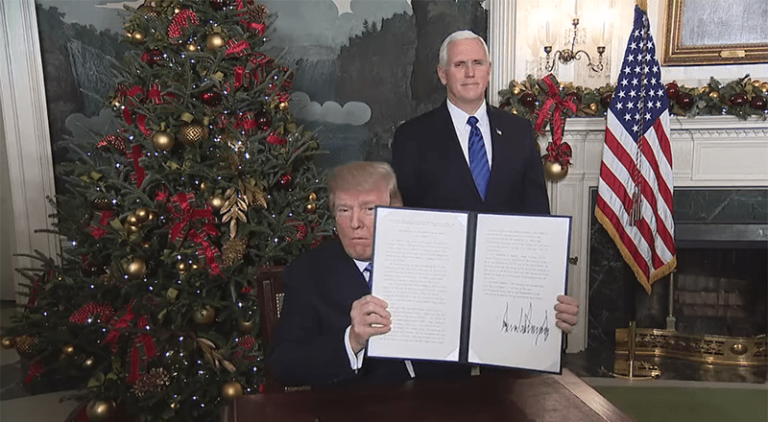
US President Donald Trump made an announcement on December 6 recognizing Jerusalem as Israel’s capital and expressing his intention to move the US embassy in Israel from Tel Aviv to Jerusalem. The president is expected to sign the national security waiver of the US Congress’s Jerusalem Embassy Act of 1995, delaying the relocation of the embassy for another six months—reportedly for logistical reasons—but he did formally recognize Jerusalem as the capital of Israel and instructed the State Department to begin the process of relocating the embassy.
President Trump downplayed this step, saying the status of Jerusalem and issues of borders remain to be decided between the two parties through final-status negotiations. He even argued, in flawed logic, that since having the embassy in Tel Aviv did not produce peace for over two decades, doing things differently (i.e., moving the US embassy to Jerusalem) might aid the peace process. The president made contradictory statements regarding the status of Jerusalem; he unilaterally declared it the capital of Israel while also confirming that Jerusalem’s status would be decided by the two parties. President Trump misrepresented the notion of sovereignty, suggesting that a sovereign state can choose its own capital regardless of that city’s legal status and international law, and even called the move a great deal for the Palestinians. He also ignored the realities of Palestinians (Christian and Muslim) living under a brutal Israeli occupation for decades, and did not acknowledge the Palestinians’ equal rights for sovereignty, territories, and religious sites.
Most world leaders and organizations opposed this announcement and previously warned President Trump that this move would have dangerous consequences. While such a controversial measure will have catastrophic ramifications for the peace process and intensify violence and instability in the region, the real consequences lie in the position of the United States in global affairs.
US in Violation of International Law
The city of Jerusalem, including both East Jerusalem and West Jerusalem, was designated “a corpus separatum under a special international regime” in UN General Assembly Resolution 181, recognizing its importance for the three monotheistic religions. Although this separate international status was never implemented and Israel continues to control the city, no state recognizes Jerusalem as the capital of Israel and no country has its embassy in the city.
Other resolutions regarding Jerusalem, such as Security Council Resolutions 252 (1968), 267 (1969), 271 (1969), 298 (1971), 465 (1980), 476 (1980), and others, affirm that any changes by force to the character and status of Jerusalem are null and void, stand in violation of the Fourth Geneva Convention, and constitute a serious obstacle to achieving peace. Additionally, according to the Geneva Conventions, any territory that is acquired through war is considered under “hostile military occupation.” The United States itself issued Letters of Assurances to the Palestinians in 1991, stating that it “does not recognize Israel’s annexation of East Jerusalem.”
All these legal frameworks still stand today. However, with the lack of any enforcement mechanisms, Israel has continued its unilateral actions in altering the character and status of Jerusalem and creating “facts on the ground” in the form of illegal settlements, in stark violation of international law. By endorsing Israeli plans in Jerusalem and recognizing the city as Israel’s capital, the United States becomes complicit in violations of international law and UN resolutions.
Serious Repercussions: Peace, Violence, and the International Order
The United States’ recognition of Jerusalem as Israel’s capital, though in technical terms may be more symbolic at this time, has significant political implications for the region. While Israel has controlled Jerusalem for decades, this step threatens any remaining prospects for the two-state solution, Palestinian statehood, and East Jerusalem as the Palestinian capital. Further, Jerusalem has a special symbolic significance not only among Palestinians but also Arabs and Muslims alike; recognizing it as Israel’s capital might prove disastrous for the region and for US diplomacy.
Palestinian President Mahmoud Abbas rejected Trump’s declaration, saying the decision encourages Israeli occupation and settlements, while Palestinian factions called for three days of protests. Arab and international leaders expressed concern and cautioned that such a risky move would have serious repercussions. The European Union, Germany, France, Russia, the United Kingdom, Canada, and even Pope Francis opposed the decision. French President Emmanuel Macron called it “unfortunate” and said he does not support it, while British Prime Minister Theresa May described it as “unhelpful” in terms of peace in the region. The United Nations opposed the one-sided step by the United States. Jordan, Egypt, and Saudi Arabia disapproved of the move and signaled a possible Arab League meeting to discuss the matter. Prior to the announcement, Turkish president Recep Tayyip Erdoğan described Jerusalem as a “red line” and warned about severing relations with Israel, while the Organization of Islamic Cooperation issued a statement the day before calling on its 57 member states to sever ties with entities that recognize Israel’s annexation of the city. Whether such severing of ties will materialize remains to be seen.
While this chorus of statements and warnings by leaders may turn out to be little more than lip service, the reaction by the popular masses would likely be more significant. As shown by a recent poll conducted by Arab Center Washington DC, the overwhelming majority of Arab publics (88 percent) consider the Palestinian cause as important to them personally, despite an increasingly divided region on other issues. This demonstrates the explosive potential Trump’s Jerusalem decision might have in the Arab world, one possibly larger than the scale of protests that took place in the summer following Israel’s employment of metal detectors at the entrance of Al-Aqsa mosque in Jerusalem. Ironically, and at the same time as acknowledging that Jerusalem is one of the most sensitive issues in the peace talks, President Trump announced this controversial recognition of Jerusalem as Israel’s capital and still expressed Washington’s commitment to facilitating a peace process.
Regarding the anticipated protests, President Trump made sure in his statement to paint any opposition as radical; he called for calm and moderation, all the while announcing one of the most extreme decisions in US history. He called on people and leaders in the region to “expel extremism” and “respond with reasoned debate,” while his very decision holds no reason and would likely fuel extremists and provide fodder for violent groups to recruit members and incite violence.
Warnings about serious repercussions of the move, including hindering the peace process and igniting violence, are valid yet they are hardly new. While many analysts describe this recognition as calamitous as it derails hopes for peace, the fact of the matter is that there are hardly any hopes for peace that could be derailed. Even more so, human rights violations and violence have been the daily realities of Palestinians for decades. Some have also warned of the potential impact on the United States’ credibility as a neutral mediator of the conflict, but that ship has long sailed. Whereas these would be serious immediate consequences, the long-term threat is to US standing.
The status of Jerusalem must be decided through negotiations along with other final-status issues. This has been the unequivocal international opinion and long-standing US policy. The most significant result of a decision of this scale by President Trump is breaking with decades of US policy, through unilaterally endorsing a final status on Jerusalem outside the framework of negotiations, just solutions, and international law.
This, in fact, would constitute unprecedented, blatant American support and endorsement of the illegal Israeli projects of settlement building and expansion, home demolitions, population transfer, and demographic engineering to make the lives of Palestinians unbearable and destroy any prospects of Palestinian statehood.
Such a formal position by the world’s greatest power in favor of force over international law will set a dangerous precedent in the international order. We should expect to see an even more emboldened Israeli right-wing government and a diminished role for international diplomacy. Undermining international law and consensus is no way to achieve a peaceful “ultimate deal” to the Palestinian-Israeli conflict and stability in the world.
The “America Last” Ultimate Deal
The Trump Administration’s theatrical handling of the situation—letting the Monday midnight deadline expire, making last-minute phone calls to regional leaders on Tuesday, and instructing Israeli officials not to discuss the matter publicly, with the ensuing declarations of opposition from Arab and international leaders—might have been the touch of drama, distraction, or gratification that the American president needed.
While President Trump’s announcement may come as a surprise, his impulsive reactions and focus on personal gratification are not. Trump’s decision might be an indication that his rumored plan for Middle East peace has failed even before seeing the light. The set of ingredients that Trump put together to achieve the “ultimate” Middle East peace deal was bound to fail, and the only deal he may be able to realize is the embassy move. The proposed peace plan of the Trump Administration, discussed with Saudi Crown Prince Mohammed bin Salman, is reported to be one that keeps Israeli settlements in the West Bank and grants Palestinians the East Jerusalem suburb of Abu Dis, instead of East Jerusalem itself, as their capital, without any options for return or compensation for Palestinian refugees. One can easily see how such a plan, which forsakes the foundations of the two-state solution, would not see the light of day. For President Trump, a deal that garners him praise from his conservative and pro-Israel supporters is better than no deal, regardless of the consequences.
Another possible scenario involves the politics of blackmail. With a doomed peace proposal that will never be accepted by the Palestinians, Trump may be using the embassy case as leverage to pressure Abbas to accept the peace deal. Further, if the United States wants to be a serious player in resolving the conflict, expiration dates imposed on Palestinian access issues, including threatening to close the PLO office in Washington and the embassy move, need to be reconsidered. For the United States to succeed, it needs to play an evenhanded role, abandon techniques of coercion and blackmail against the Palestinians, and drop laws that violate international law and obstruct the achievement of a just peace. To be sure, this decision is not part of any larger strategy or peace deal. It is merely a political statement likely for domestic purposes, but it is one that further demonstrates Israel’s dominance in US politics.
Whatever Trump’s reasons are, be they self-gratification, blackmail, distraction, fulfilling a campaign promise, or even satisfying his biggest campaign donor Sheldon Adelson, there is hardly anyone who thinks this move is in the interest of the United States.
For a president who campaigned on an “America First” premise, this announcement only undermines US standing in the world, alienates its partners in an important region, eliminates what little credibility the United States had left as a peace broker, and even endangers American lives. The State Department has prepared for unrest and issued warnings to US citizens.
The national security waiver has been signed by every single US president since 1995 for a reason. With President Trump signing the waiver, his statement on Jerusalem offers nothing more than an unnecessary provocation that defies the international community, inflames people around the world, and further escalates the conflict instead of resolving it.
This is indeed a shameful day for the United States, where accrediting military force, violating international law, and supporting apartheid in Jerusalem mark the end of what started as a reasoned US policy.

